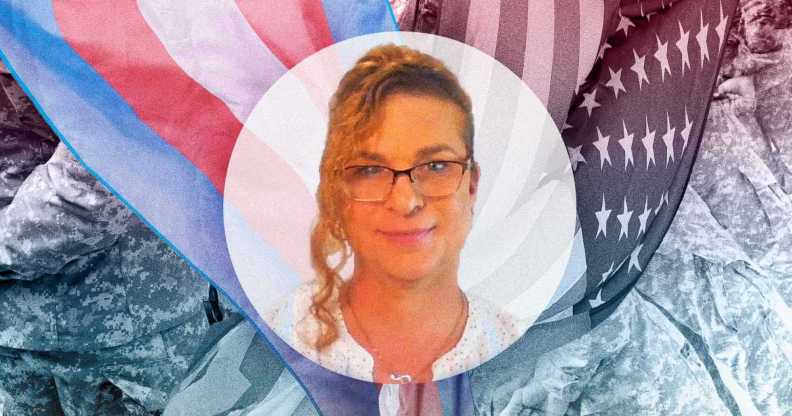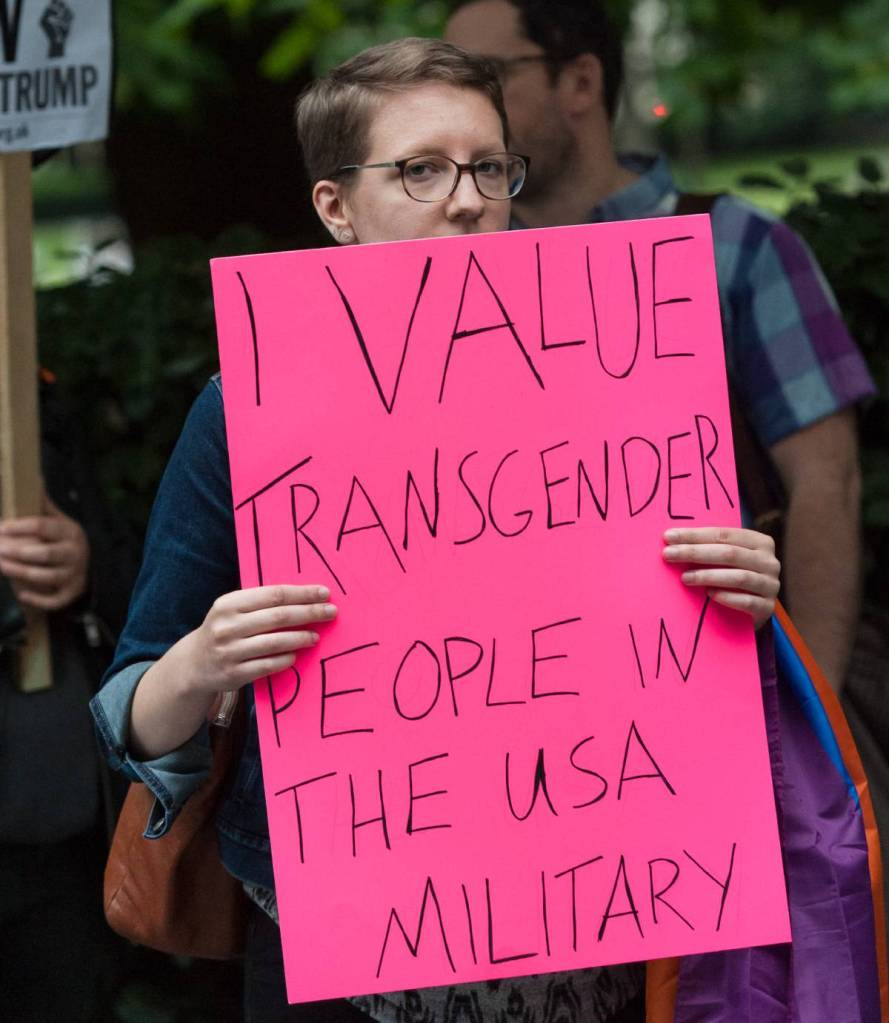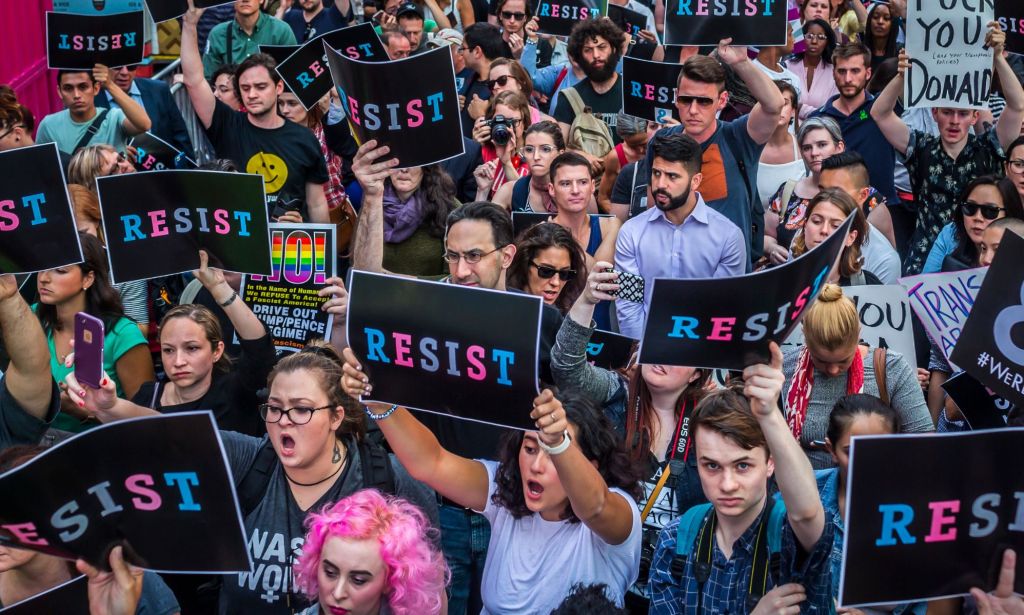Trans military bans undermine ‘very essence of the American Dream’, says Marine vet

Sarah Klimm, a trans veteran, says preventing anyone from openly serving in the military goes against the ‘essence of the American dream’. (Getty Images/Supplied)
Sarah Klimm, a trans veteran, says preventing anyone from openly serving in the military goes against the 'essence of the American dream'. (Getty Images/Supplied)
During the 23 years she served in the US Marine Corps, Sarah Klimm was willing to die for her country. But amid ever-increasing attacks on the trans community, she’s changed her mind.
Like all of us, Klimm has different facets of her identity. She’s a parent, a marine, a disabled veteran and a policy analyst for Minority Veterans of America. Being trans “is the last identity in [her] list of priorities”.
But she knows the sad reality is that because of her transness, some people believe she doesn’t deserve to be treated like everyone else.
“It’s ridiculous,” she tells PinkNews. “And then, I have to question: I served 23 years, for this? This is what I fought for? It’s hard.”
Klimm endured “many arduous tours” throughout her military career with the elite force.
“I could have died for this country, and I was willing to do it,” she says. “But now, I look at our country, and it’s like, I would never die for this country.
“It’s sad because it’s going in the wrong direction. The American Dream has been taken away from us. No matter what, as this continues, all my hard work and everything else doesn’t matter.
“The fact out there [is] that I’m trans, and I’m not deserving of the same rights and freedoms as everybody else.”

Trans Americans are under attack
For trans people, and those who care about the community, the past several years have been bleak.
There’s been a wave of legislation targeting gender-affirming medical care, trans athletes and the ability for trans folks to openly serve in the military. It’s part of a broader legal assault waged by right-wing pundits on LGBTQ+ rights, reproductive justice and other marginalised groups.
Until 2011, the reviled Don’t Ask, Don’t Tell (DADT) policy, established in 1994, banned LGBTQ+ individuals from openly serving in the military.
For those serving during this time, DADT placed an immense burden on their mental and physical health because of the need to hide their authentic self for fear of discovery and dishonourable discharge.
In 2017, Donald Trump’s administration announced a ban on trans people serving in the military, denying the the ability to enlist in the armed services and creating an atmosphere of fear for transgender personnel actively serving.
As many as 20 per cent of people in the trans community have served at some point in their life, which is double the percentage of America’s general population.
Former vice-president Mike Pence, in an effort to bolster his campaign for the Republican presidential nomination in 2024, has vowed to bring back the ban, which was overturned in the early days of Joe Biden’s presidency. Frontrunner Trump has, unsurprisingly, made a similar promise.
Pence claimed that having openly trans military personnel “erodes unit cohesion in a unique way”.
Klimm agrees about problems with cohesion, but not in the same way as the former governor of Indiana.

“It’s the result of discriminatory policies and a lack of unequivocal support from those in power,” she says. “True unit cohesion erodes when the civilian military leadership wavers in their commitment to fairness and equality.
“If you have wishy-washy leadership, it’s like one day it’s this, the next it’s [that]. It completely erodes readiness and cohesion, and that’s what they’re facing right now with trans ban ideas and things like that.”
Trans service members have “served openly with honour, at home and abroad since 2016 without unit disruption”, the Modern Military Association of America tells PinkNews.
“In a time of low recruitment, the focus should be on building up the force, not removing a portion of the population that serves at twice the rate of the general public.”
Over the years, Klimm witnessed the introduction of women as pilots, maintainers on aircraft and in combat service, and saw LGBTQ+ troops come out after the repeal of DADT.
Each time, she saw how the Marine Corps and other sections of the armed forces adapted to the new wave of diverse service members.

“During the repeal of [DADT], I had marines who came out, were able to come out of the closet, and I watched their productivity go up,” Klimm says. “I watched them be happy [for] even things like Marine Corps balls, sacred tradition.”
“They could never bring their partner [before that] because they were hiding in the closet. That first ball after [DADT], it was amazing to see all the marines within my units being happy they were able to [do so].”
She says it’s ridiculous to see the same excuses previously used against including other groups be lobbied against the trans community.
Denying anyone the ability to authentically serve “undermines the principles we hold dear, the very essence of the American Dream – the idea that anyone, regardless of their background, can achieve success and prosperity through hard work and determination”, she adds.

